Impact of Climate Change on Health: Policy Recommendations
VerifiedAdded on 2023/01/23
|6
|1209
|76
Report
AI Summary
This report examines the significant health challenges posed by climate change, emphasizing its impact on human health and the exacerbation of existing medical conditions. It highlights the consensus among climate scientists regarding human activities' role in driving climatic changes, leading to issues like extreme heat, pollution, and loss of biodiversity. The report identifies vulnerable populations, including the poor, elderly, and children, and discusses the increased prevalence of vector-borne diseases and other health complications. It analyzes existing policies and suggests adaptation and mitigation strategies, focusing on reducing greenhouse gas emissions, promoting alternative energy sources, and enhancing public health infrastructure. The report also assesses the impact of implementing these policies on the healthcare delivery system, emphasizing the potential for improved climate resilience and a healthier population.
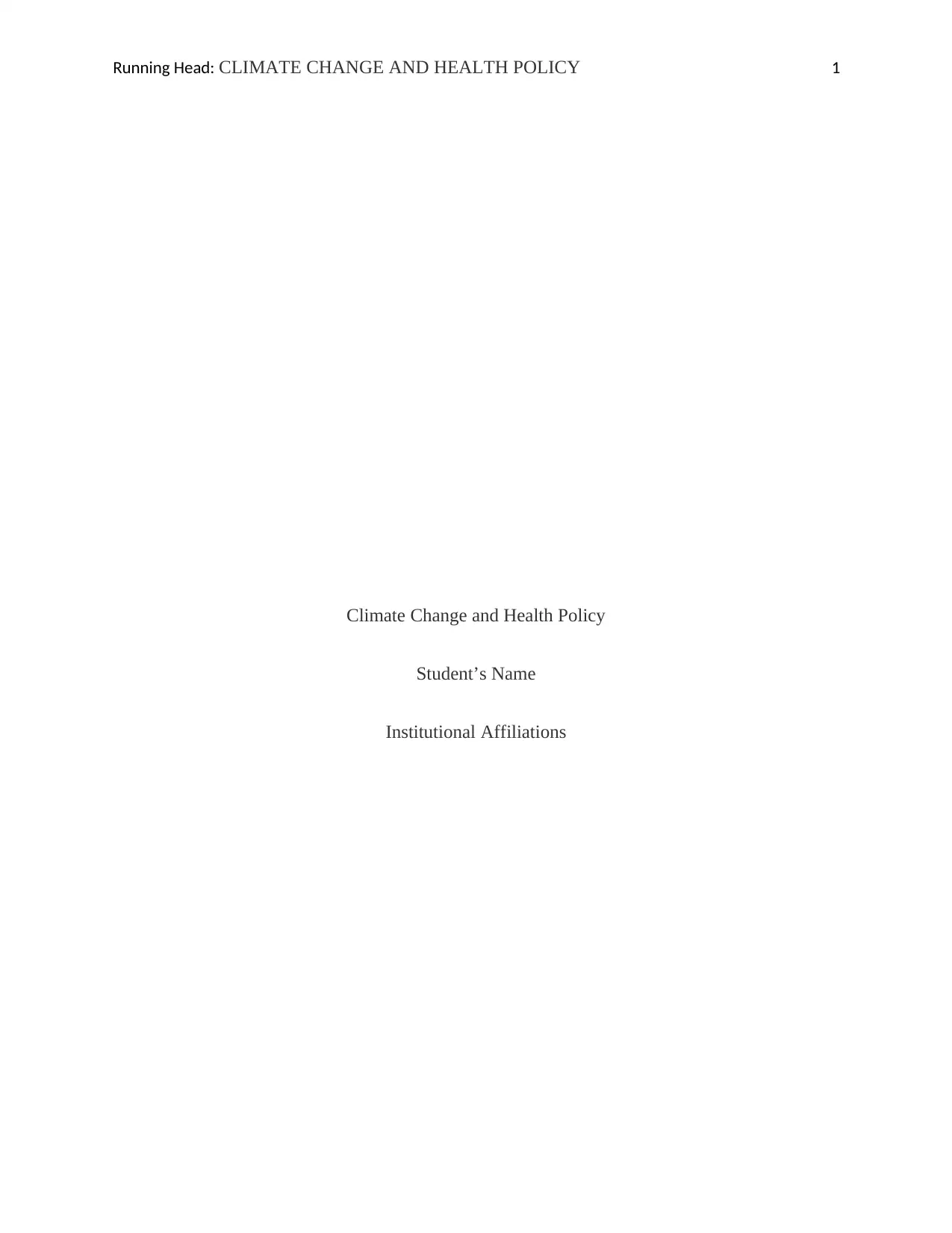
Running Head: CLIMATE CHANGE AND HEALTH POLICY 1
Climate Change and Health Policy
Student’s Name
Institutional Affiliations
Climate Change and Health Policy
Student’s Name
Institutional Affiliations
Paraphrase This Document
Need a fresh take? Get an instant paraphrase of this document with our AI Paraphraser
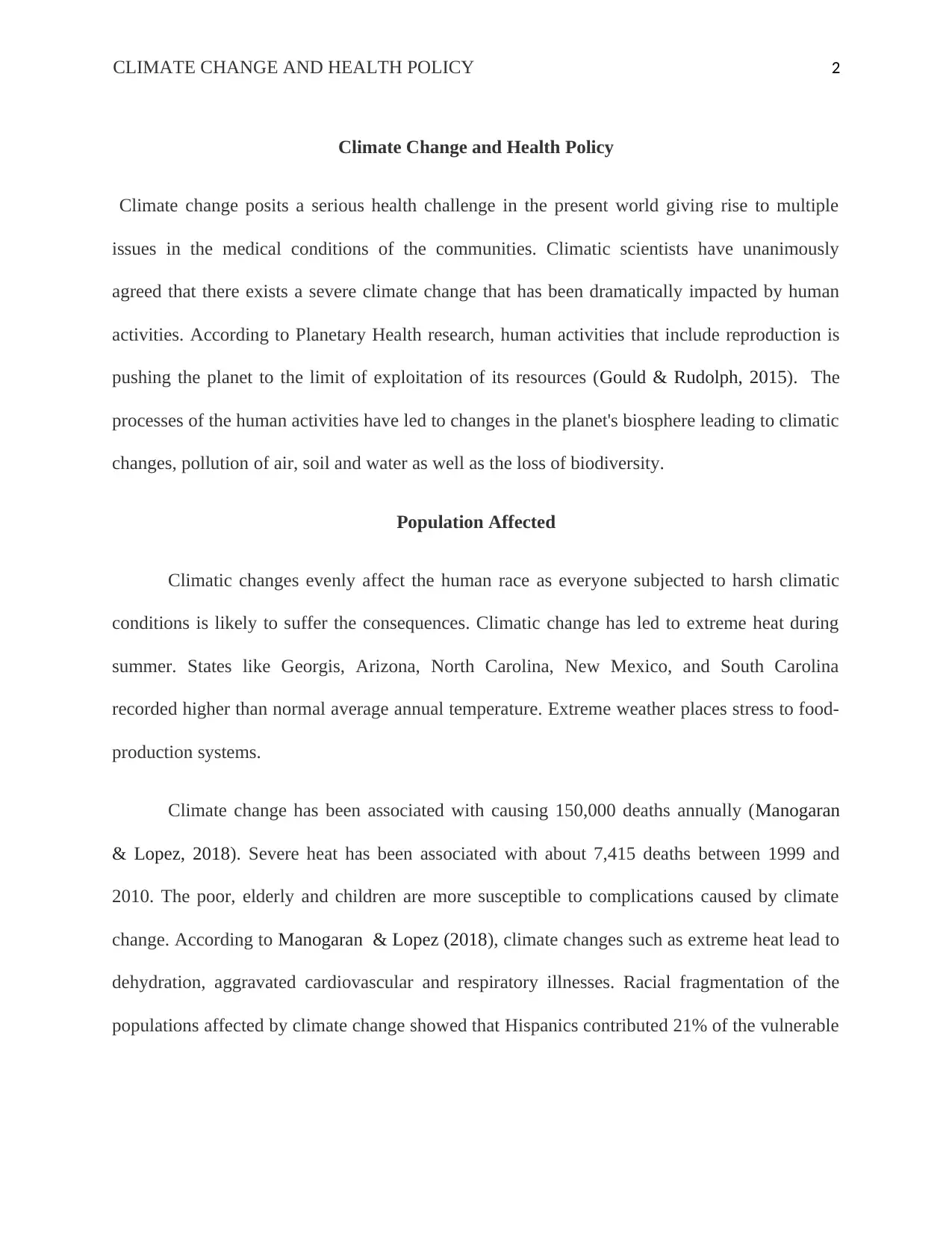
CLIMATE CHANGE AND HEALTH POLICY 2
Climate Change and Health Policy
Climate change posits a serious health challenge in the present world giving rise to multiple
issues in the medical conditions of the communities. Climatic scientists have unanimously
agreed that there exists a severe climate change that has been dramatically impacted by human
activities. According to Planetary Health research, human activities that include reproduction is
pushing the planet to the limit of exploitation of its resources (Gould & Rudolph, 2015). The
processes of the human activities have led to changes in the planet's biosphere leading to climatic
changes, pollution of air, soil and water as well as the loss of biodiversity.
Population Affected
Climatic changes evenly affect the human race as everyone subjected to harsh climatic
conditions is likely to suffer the consequences. Climatic change has led to extreme heat during
summer. States like Georgis, Arizona, North Carolina, New Mexico, and South Carolina
recorded higher than normal average annual temperature. Extreme weather places stress to food-
production systems.
Climate change has been associated with causing 150,000 deaths annually (Manogaran
& Lopez, 2018). Severe heat has been associated with about 7,415 deaths between 1999 and
2010. The poor, elderly and children are more susceptible to complications caused by climate
change. According to Manogaran & Lopez (2018), climate changes such as extreme heat lead to
dehydration, aggravated cardiovascular and respiratory illnesses. Racial fragmentation of the
populations affected by climate change showed that Hispanics contributed 21% of the vulnerable
Climate Change and Health Policy
Climate change posits a serious health challenge in the present world giving rise to multiple
issues in the medical conditions of the communities. Climatic scientists have unanimously
agreed that there exists a severe climate change that has been dramatically impacted by human
activities. According to Planetary Health research, human activities that include reproduction is
pushing the planet to the limit of exploitation of its resources (Gould & Rudolph, 2015). The
processes of the human activities have led to changes in the planet's biosphere leading to climatic
changes, pollution of air, soil and water as well as the loss of biodiversity.
Population Affected
Climatic changes evenly affect the human race as everyone subjected to harsh climatic
conditions is likely to suffer the consequences. Climatic change has led to extreme heat during
summer. States like Georgis, Arizona, North Carolina, New Mexico, and South Carolina
recorded higher than normal average annual temperature. Extreme weather places stress to food-
production systems.
Climate change has been associated with causing 150,000 deaths annually (Manogaran
& Lopez, 2018). Severe heat has been associated with about 7,415 deaths between 1999 and
2010. The poor, elderly and children are more susceptible to complications caused by climate
change. According to Manogaran & Lopez (2018), climate changes such as extreme heat lead to
dehydration, aggravated cardiovascular and respiratory illnesses. Racial fragmentation of the
populations affected by climate change showed that Hispanics contributed 21% of the vulnerable
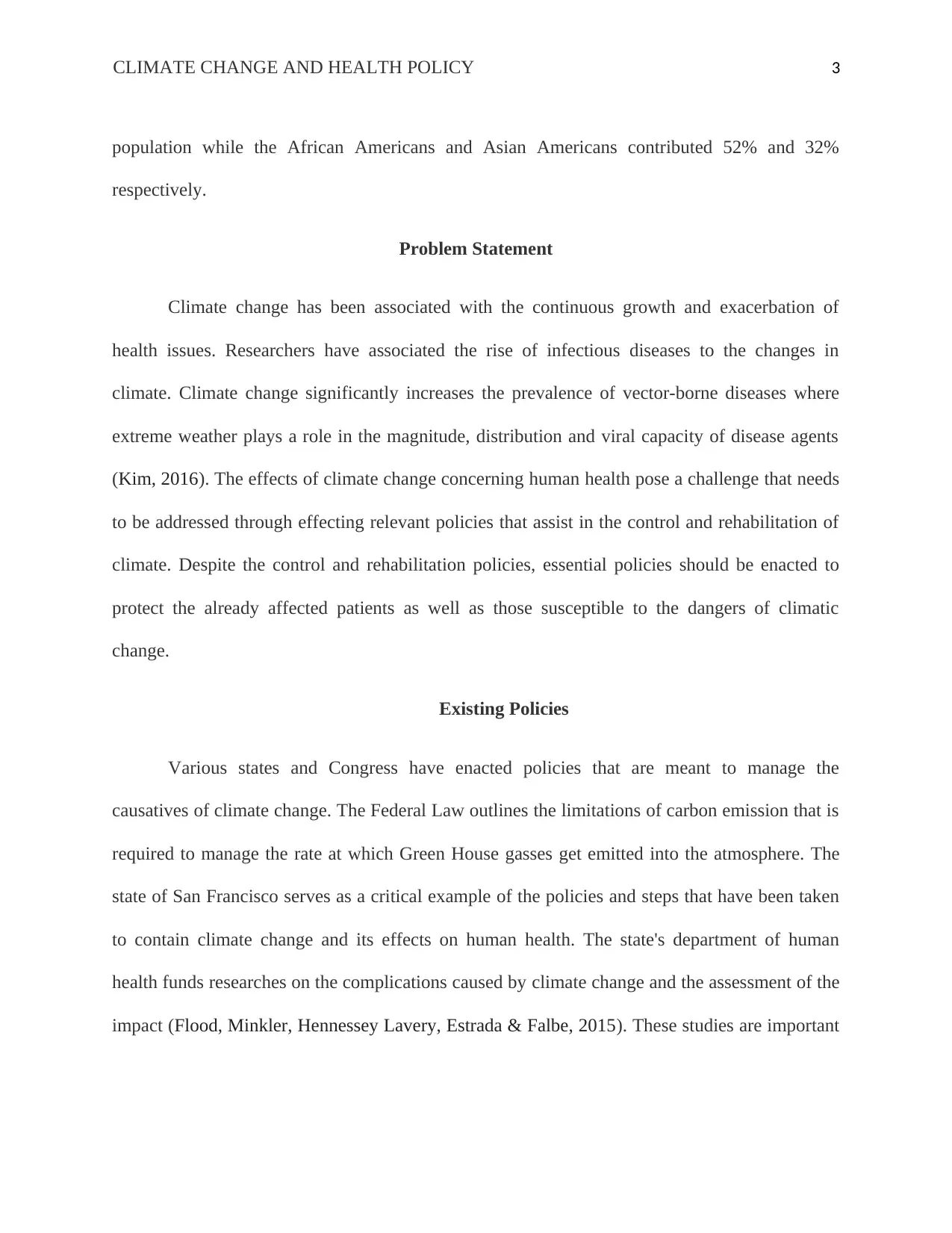
CLIMATE CHANGE AND HEALTH POLICY 3
population while the African Americans and Asian Americans contributed 52% and 32%
respectively.
Problem Statement
Climate change has been associated with the continuous growth and exacerbation of
health issues. Researchers have associated the rise of infectious diseases to the changes in
climate. Climate change significantly increases the prevalence of vector-borne diseases where
extreme weather plays a role in the magnitude, distribution and viral capacity of disease agents
(Kim, 2016). The effects of climate change concerning human health pose a challenge that needs
to be addressed through effecting relevant policies that assist in the control and rehabilitation of
climate. Despite the control and rehabilitation policies, essential policies should be enacted to
protect the already affected patients as well as those susceptible to the dangers of climatic
change.
Existing Policies
Various states and Congress have enacted policies that are meant to manage the
causatives of climate change. The Federal Law outlines the limitations of carbon emission that is
required to manage the rate at which Green House gasses get emitted into the atmosphere. The
state of San Francisco serves as a critical example of the policies and steps that have been taken
to contain climate change and its effects on human health. The state's department of human
health funds researches on the complications caused by climate change and the assessment of the
impact (Flood, Minkler, Hennessey Lavery, Estrada & Falbe, 2015). These studies are important
population while the African Americans and Asian Americans contributed 52% and 32%
respectively.
Problem Statement
Climate change has been associated with the continuous growth and exacerbation of
health issues. Researchers have associated the rise of infectious diseases to the changes in
climate. Climate change significantly increases the prevalence of vector-borne diseases where
extreme weather plays a role in the magnitude, distribution and viral capacity of disease agents
(Kim, 2016). The effects of climate change concerning human health pose a challenge that needs
to be addressed through effecting relevant policies that assist in the control and rehabilitation of
climate. Despite the control and rehabilitation policies, essential policies should be enacted to
protect the already affected patients as well as those susceptible to the dangers of climatic
change.
Existing Policies
Various states and Congress have enacted policies that are meant to manage the
causatives of climate change. The Federal Law outlines the limitations of carbon emission that is
required to manage the rate at which Green House gasses get emitted into the atmosphere. The
state of San Francisco serves as a critical example of the policies and steps that have been taken
to contain climate change and its effects on human health. The state's department of human
health funds researches on the complications caused by climate change and the assessment of the
impact (Flood, Minkler, Hennessey Lavery, Estrada & Falbe, 2015). These studies are important
⊘ This is a preview!⊘
Do you want full access?
Subscribe today to unlock all pages.

Trusted by 1+ million students worldwide
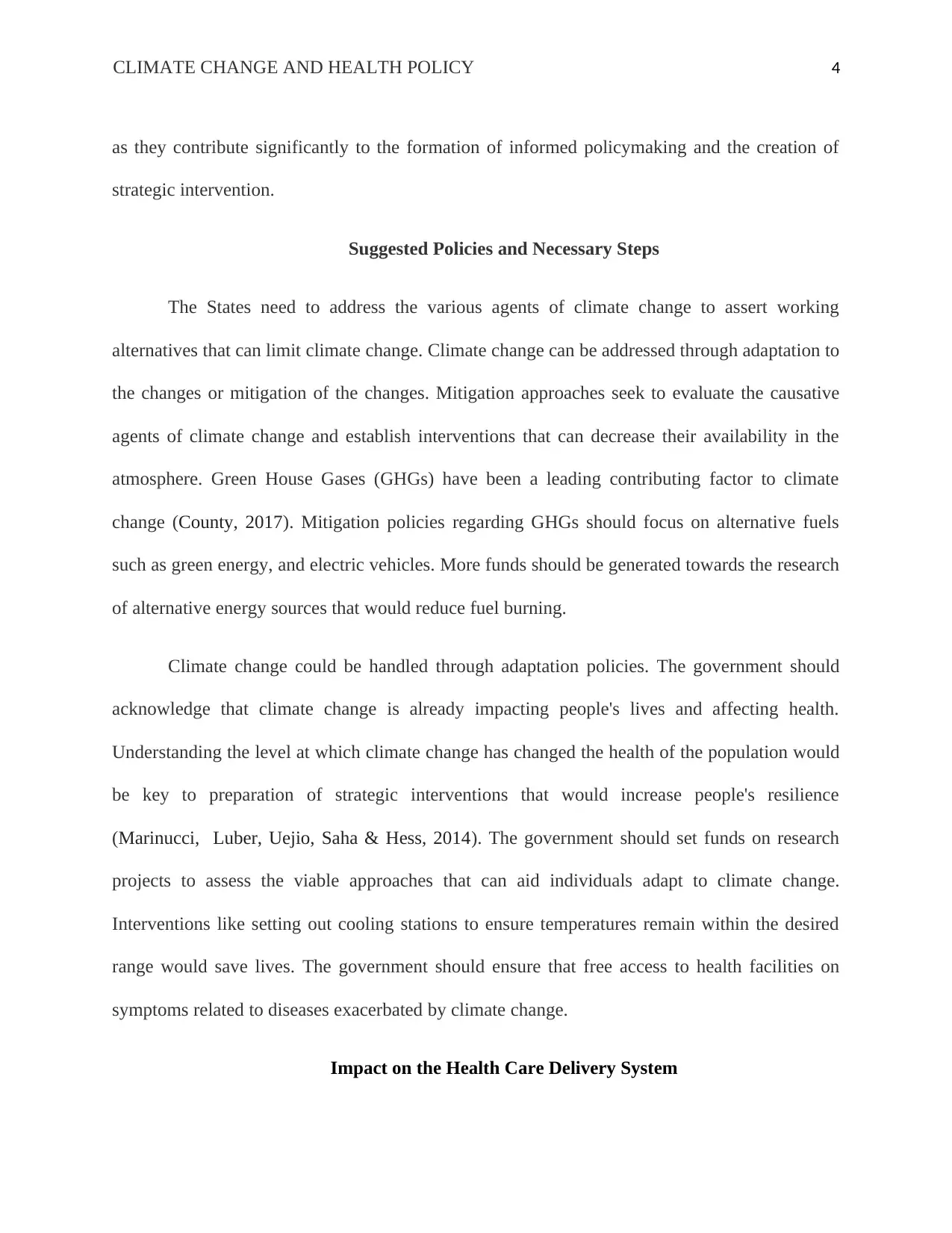
CLIMATE CHANGE AND HEALTH POLICY 4
as they contribute significantly to the formation of informed policymaking and the creation of
strategic intervention.
Suggested Policies and Necessary Steps
The States need to address the various agents of climate change to assert working
alternatives that can limit climate change. Climate change can be addressed through adaptation to
the changes or mitigation of the changes. Mitigation approaches seek to evaluate the causative
agents of climate change and establish interventions that can decrease their availability in the
atmosphere. Green House Gases (GHGs) have been a leading contributing factor to climate
change (County, 2017). Mitigation policies regarding GHGs should focus on alternative fuels
such as green energy, and electric vehicles. More funds should be generated towards the research
of alternative energy sources that would reduce fuel burning.
Climate change could be handled through adaptation policies. The government should
acknowledge that climate change is already impacting people's lives and affecting health.
Understanding the level at which climate change has changed the health of the population would
be key to preparation of strategic interventions that would increase people's resilience
(Marinucci, Luber, Uejio, Saha & Hess, 2014). The government should set funds on research
projects to assess the viable approaches that can aid individuals adapt to climate change.
Interventions like setting out cooling stations to ensure temperatures remain within the desired
range would save lives. The government should ensure that free access to health facilities on
symptoms related to diseases exacerbated by climate change.
Impact on the Health Care Delivery System
as they contribute significantly to the formation of informed policymaking and the creation of
strategic intervention.
Suggested Policies and Necessary Steps
The States need to address the various agents of climate change to assert working
alternatives that can limit climate change. Climate change can be addressed through adaptation to
the changes or mitigation of the changes. Mitigation approaches seek to evaluate the causative
agents of climate change and establish interventions that can decrease their availability in the
atmosphere. Green House Gases (GHGs) have been a leading contributing factor to climate
change (County, 2017). Mitigation policies regarding GHGs should focus on alternative fuels
such as green energy, and electric vehicles. More funds should be generated towards the research
of alternative energy sources that would reduce fuel burning.
Climate change could be handled through adaptation policies. The government should
acknowledge that climate change is already impacting people's lives and affecting health.
Understanding the level at which climate change has changed the health of the population would
be key to preparation of strategic interventions that would increase people's resilience
(Marinucci, Luber, Uejio, Saha & Hess, 2014). The government should set funds on research
projects to assess the viable approaches that can aid individuals adapt to climate change.
Interventions like setting out cooling stations to ensure temperatures remain within the desired
range would save lives. The government should ensure that free access to health facilities on
symptoms related to diseases exacerbated by climate change.
Impact on the Health Care Delivery System
Paraphrase This Document
Need a fresh take? Get an instant paraphrase of this document with our AI Paraphraser
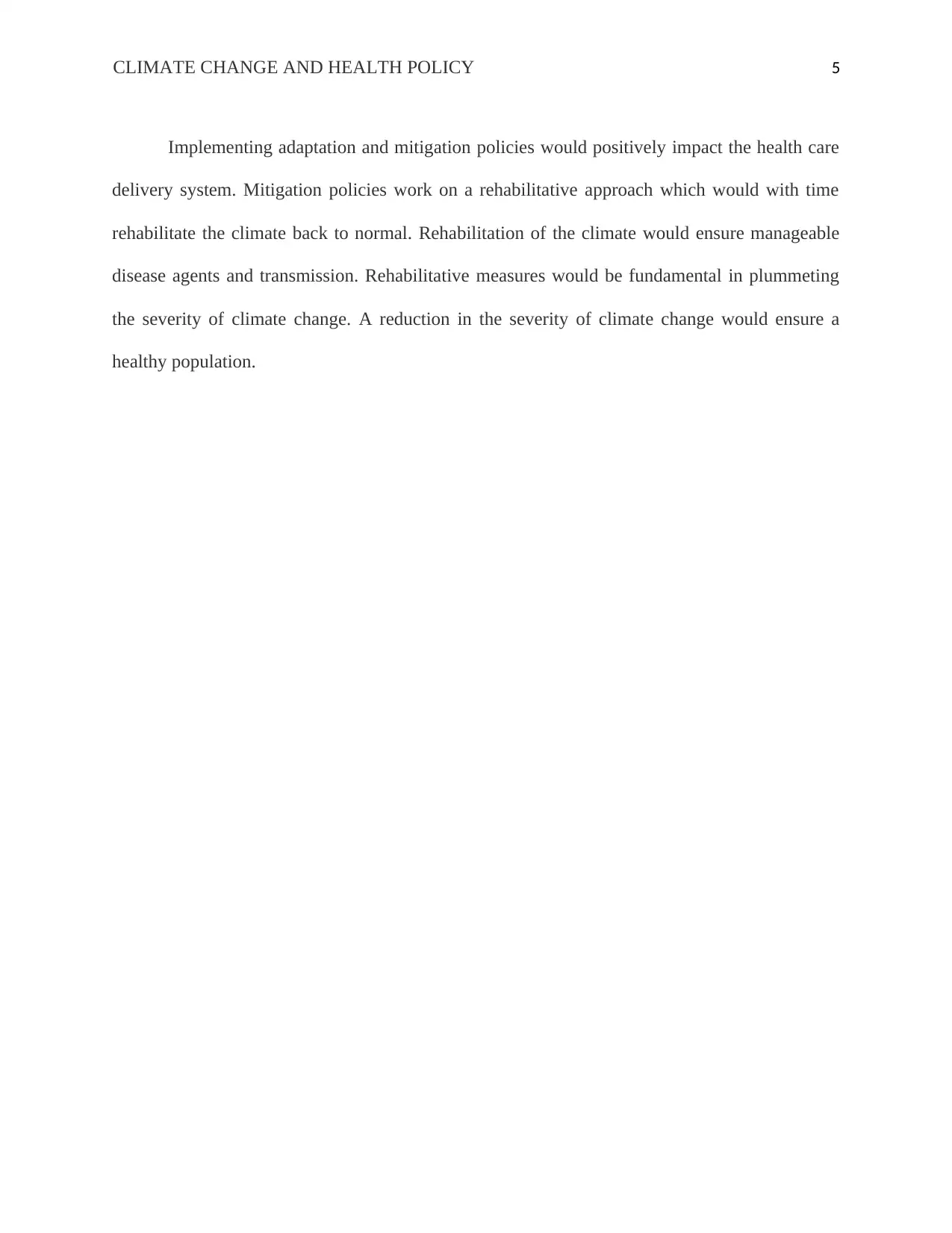
CLIMATE CHANGE AND HEALTH POLICY 5
Implementing adaptation and mitigation policies would positively impact the health care
delivery system. Mitigation policies work on a rehabilitative approach which would with time
rehabilitate the climate back to normal. Rehabilitation of the climate would ensure manageable
disease agents and transmission. Rehabilitative measures would be fundamental in plummeting
the severity of climate change. A reduction in the severity of climate change would ensure a
healthy population.
Implementing adaptation and mitigation policies would positively impact the health care
delivery system. Mitigation policies work on a rehabilitative approach which would with time
rehabilitate the climate back to normal. Rehabilitation of the climate would ensure manageable
disease agents and transmission. Rehabilitative measures would be fundamental in plummeting
the severity of climate change. A reduction in the severity of climate change would ensure a
healthy population.
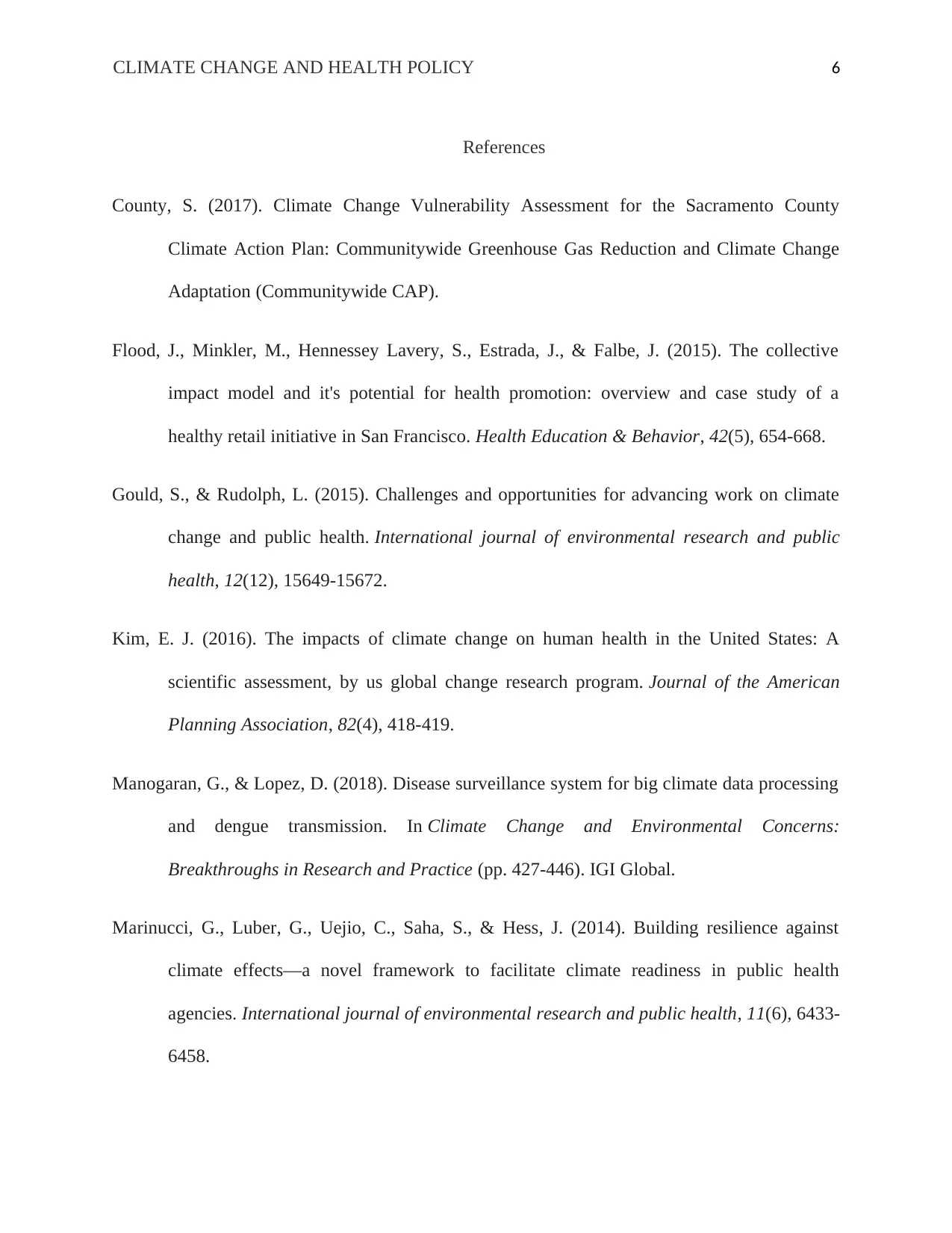
CLIMATE CHANGE AND HEALTH POLICY 6
References
County, S. (2017). Climate Change Vulnerability Assessment for the Sacramento County
Climate Action Plan: Communitywide Greenhouse Gas Reduction and Climate Change
Adaptation (Communitywide CAP).
Flood, J., Minkler, M., Hennessey Lavery, S., Estrada, J., & Falbe, J. (2015). The collective
impact model and it's potential for health promotion: overview and case study of a
healthy retail initiative in San Francisco. Health Education & Behavior, 42(5), 654-668.
Gould, S., & Rudolph, L. (2015). Challenges and opportunities for advancing work on climate
change and public health. International journal of environmental research and public
health, 12(12), 15649-15672.
Kim, E. J. (2016). The impacts of climate change on human health in the United States: A
scientific assessment, by us global change research program. Journal of the American
Planning Association, 82(4), 418-419.
Manogaran, G., & Lopez, D. (2018). Disease surveillance system for big climate data processing
and dengue transmission. In Climate Change and Environmental Concerns:
Breakthroughs in Research and Practice (pp. 427-446). IGI Global.
Marinucci, G., Luber, G., Uejio, C., Saha, S., & Hess, J. (2014). Building resilience against
climate effects—a novel framework to facilitate climate readiness in public health
agencies. International journal of environmental research and public health, 11(6), 6433-
6458.
References
County, S. (2017). Climate Change Vulnerability Assessment for the Sacramento County
Climate Action Plan: Communitywide Greenhouse Gas Reduction and Climate Change
Adaptation (Communitywide CAP).
Flood, J., Minkler, M., Hennessey Lavery, S., Estrada, J., & Falbe, J. (2015). The collective
impact model and it's potential for health promotion: overview and case study of a
healthy retail initiative in San Francisco. Health Education & Behavior, 42(5), 654-668.
Gould, S., & Rudolph, L. (2015). Challenges and opportunities for advancing work on climate
change and public health. International journal of environmental research and public
health, 12(12), 15649-15672.
Kim, E. J. (2016). The impacts of climate change on human health in the United States: A
scientific assessment, by us global change research program. Journal of the American
Planning Association, 82(4), 418-419.
Manogaran, G., & Lopez, D. (2018). Disease surveillance system for big climate data processing
and dengue transmission. In Climate Change and Environmental Concerns:
Breakthroughs in Research and Practice (pp. 427-446). IGI Global.
Marinucci, G., Luber, G., Uejio, C., Saha, S., & Hess, J. (2014). Building resilience against
climate effects—a novel framework to facilitate climate readiness in public health
agencies. International journal of environmental research and public health, 11(6), 6433-
6458.
⊘ This is a preview!⊘
Do you want full access?
Subscribe today to unlock all pages.

Trusted by 1+ million students worldwide
1 out of 6
Related Documents
Your All-in-One AI-Powered Toolkit for Academic Success.
+13062052269
info@desklib.com
Available 24*7 on WhatsApp / Email
![[object Object]](/_next/static/media/star-bottom.7253800d.svg)
Unlock your academic potential
Copyright © 2020–2025 A2Z Services. All Rights Reserved. Developed and managed by ZUCOL.





